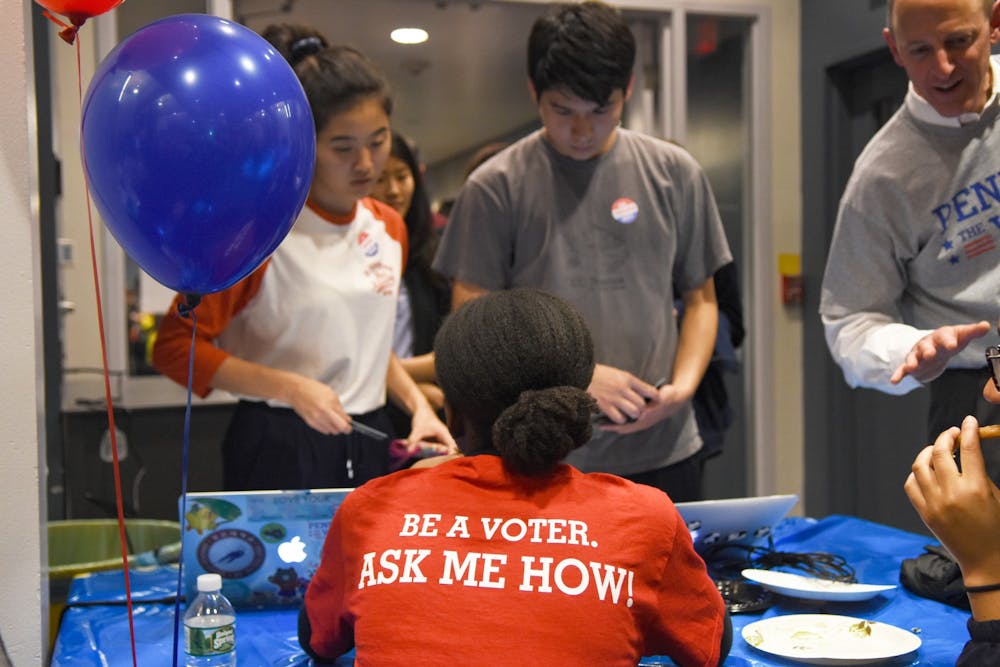
As Philadelphia's local election day approaches, it is crucial that students at Penn, where civic engagement is touted as being “central to the intellectual experience,” acknowledge the importance of voting, and not let feelings of despair and hopelessness about the current state of our country scare us away from the polls.
It is also critical to recognize that, since the country’s founding, a select few wealthy, white men have used legal and extralegal strategies to deny representation to people of color, women, and other marginalized groups, and have successfully written explicit and implicit voting restrictions into law to uphold the views of the one percent. Were it not for brave civil rights advocates dedicating their entire lives to establishing the right to vote for disenfranchised minorities, many of us at Penn wouldn’t be able to vote today.
That said, significant populations of our country are still disenfranchised. While policies such as the three-fifths compromise and Black Codes were eventually deemed unconstitutional, mass incarceration has become the latest form of subjugation. It is therefore crucial that everyone who is fortunate enough to vote — including Penn students, who are part of a generation that is said to have the most political pull — use their vote to honor the work of voting rights activists who have paved the way, and of those who are not able to do so.
But it is not enough to vote every four years in presidential elections — or even every two years in Congressional elections. Local and state elections that fall in the interim years, such as this year, can have just as much, if not more, of an effect on voters’ daily lives. State and local elected officials make laws affecting schools and colleges, policing and public safety, affordable housing, public transit, job training programs, alcohol and marijuana ordinances, sanctuary city status, and much more. In addition, landmark federal policies such as women’s suffrage, marriage equality, and minimum wage all began at the municipal level.
And yet, a disappointing 27% of eligible voters nationwide vote in municipal elections, compared to 61% in the past two presidential elections, which results in local governments being comprised of unrepresentative individuals, who well may not have their neighbors’ best interests at heart. And when you compare the percentages of U.S. voters in national elections to the percentage of voters in Belgium (87.2%), Sweden (82.6%), and Denmark (80.3%), to name but a few, it is clear that the United States is drastically behind.
While it does seem hard to believe, individual votes do make a difference. Not only have state and local social justice referenda been decided by small margins — a bill ensuring access to healthcare in Florida in 2012, for example, was decided by a margin of barely three percentage points — but over the last 20 years, there have been a dozen races that either were decided by a single vote or ended in a tie.
I know that Nov. 5 will bring about its normal Tuesday chaos at Penn, especially in the midst of midterm season, but it is imperative that Penn students and eligible voters nationwide take the time out of their day not just to head to the polls, but to cast informed votes. Decide what matters most to you, be it healthcare, welfare, crime, education, or the environment. Find out what each candidate thinks about each of those issues, and choose the candidate whose platform best aligns with your values and ideas, and who you think will do the best job. You can also look at which groups endorse which candidates, to help influence your decision.
For those who plan on voting in Philadelphia, Penn Leads the Vote is a non-partisan program that increases voter engagement and provides general information on voting, such as polling location, voting accessibility, and foreign language assistance, in addition to an overview of what is on the ballot (which will be updated closer to election day). In the interim, Ballot Pedia provides election information for the state of Pennsylvania, including local ballot measures. Pennsylvania Voter Services and Philadelphia Votes provide a list of the candidates for city council and a sample ballot for your district, and The Philadelphia Citizen has published a voter guide.
For Penn students who are voting in their home state, Vote 411 and Rock the Vote are helpful resources to ensure that you are similarly informed about your state’s ballot policies, voting rights, polling place hours and locations, and absentee deadlines.
Voting by Generation Z college students — the “progressive generation” — doubled from the 2014 midterm election to the 2018 midterm election, which is credited to increased emphasis on civic learning, community engagement, student activism on college campuses, and frustration with President Trump and the country’s current political climate. While this shows great promise for the critical 2020 presidential election, it is equally important to continue this trend in next month’s municipal elections, especially as, once again, politicians in closely divided states are doing everything they can to erect roadblocks to the polls for college students. Your vote can make a difference.

HADRIANA LOWENKRON is a College sophomore studying Urban Studies. Her email address is lowenkron@thedp.com.
The Daily Pennsylvanian is an independent, student-run newspaper. Please consider making a donation to support the coverage that shapes the University. Your generosity ensures a future of strong journalism at Penn.
Donate



